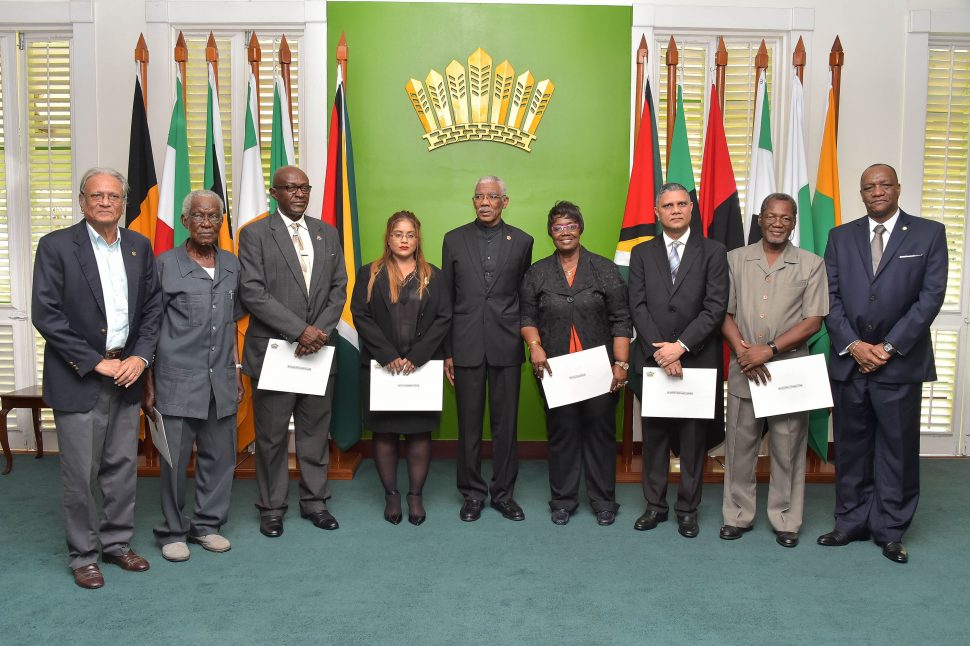The six members of the Public Service Commission (PSC) were sworn in yesterday by President David Granger and former Assistant Police Commissioner and attorney at law Michael Somersall is the Chairman.
“The Public Service Commission’s task is to ensure the establishment and existence of an impartial Public Service by insulating public servants from political influence and interference”, the President said shortly after handing out instruments of appointment to Somersall, Mavis Benn, Vincent Bowman, Geeta Chandan-Edmond, Maurice Gajadhar and Mortimer Livan. Stabroek News subsequently learnt that Somersall, 68, has been appointed Chairman. They took their oath of office during a simple ceremony at State House.
A meeting between Granger and Opposition Leader Bharrat Jagdeo several weeks ago cleared the way for the appointment of the PSC as well as members of the Police Service Commission. This newspaper understands that the Police Service Commis-sion’s members will be sworn in today.
Granger in his remarks, made reference to Article 201 (1)) of the constitution which vests the Public Service Commission with certain powers.
He noted that the PSC promotes a professional Public Service by ensuring that its appointments are based on the ”principle of merit rather than political patronage” and that disciplinary action and removals, when necessary, are just. The Commission, he stressed, can enhance the professionalism of the Public Service by appointing public servants who “evince the qualities of impartiality, integrity and intelligence”.
Further, he said that yesterday’s ceremony reaffirms government’s respect for the PSC’s independence and for the commitment to support the work of the commission, a body that is essential to “maintaining public trust in government”.
Granger told the persons gathered at State House, that the country’s development demands a proficient, professional Public Service. “Public servants are essential to the country’s administration because they exert direct and daily influence on the lives of Guyanese through various official agencies, boards, commissions, departments and ministries”, he said.
He recalled that at the swearing in of the Public Service Appellate Tribunal last May, he had said that the public service’s work is enhanced when it is supported by a system which ensures respect for the principle of a meritocracy and the structure of a bureaucracy.
No conflict of interest
Sommersall was adamant that his PSC membership will not conflict with him being a government-appointed special prosecutor, working closely with the Special Organized Crime Unit (SOCU).
“I don’t think so but I think I will have to scale down”, he told reporters shortly after the swearing in ceremony.
On the issue of remaining a special prosecutor, he said that he may have to “scale down” or “forego” that position. He noted that it is too early to make a decision as to which of the options he is likely to take. “I guess when I get there as I said I will see what I have to do”, he said pointing out that his decision hinges on his workload at the commission compared with what he has to do in the courts.
He stated that he was elated to have been appointed as a member of the commission and that the first order of business is meeting as a whole to decide how the commission is going to strategize, to deal with members of the public service.
The attorney noted that he has no idea what the workload in terms of the existing vacancies and complaints is like. “I am new to it so when we get there at the meeting then we will know exactly what we have to do and charter our course”, he said.
From 1992 to 2004 when he began his legal career, Somersall was a member of the police force, his highest rank being an Assistant Commissioner. He is also a former member of the parole board and the Guyana Gold Board.
Permanent Secretary of the Ministry of the Presidency’s Department of the Public Service, Reginald Brotherson, who was on hand to witness the swearing in, expressed confidence that the commission with some guidance from the secretary would be able to dispose of the pile-up of work.
“I would imagine that they have a lot of things because in fact the commission had been out for a little while so there are a number of endorsements, approvals, request for filling of vacancies …that I would imagine that the commission has to address”, he said before stressing that the commission has to regulate its own business.
He added that some of those appointed are “really new members” who have not served on the commission before. As such, he said they would need to orient themselves with the existing rules and regulations.










